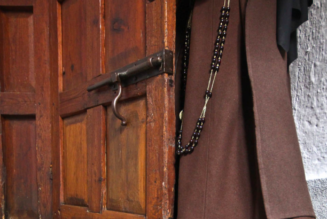, June 24, 2021

Death is the ultimate mockery of God, and Jesus is the ultimate answer to the devil in the readings for the 13th Sunday of Ordinary Time Year B.
Jesus cures two different people in the Gospel this Sunday after seeing their humility and faith.
This Sunday’s Gospel story takes place immediately after Jesus lands and is met by a large crowd. That means that those who approach him have to do so in front of an audience.
First, Jairus, a synagogue leader with a sick daughter, meets him and humbles himself: “he fell at his feet and pleaded.” He throws caution, and shame, to the wind and risks his reputation to approach the controversial rabbi.
Then came a woman “afflicted with hemorrhages for twelve years” who “had suffered greatly at the hands of many doctors and spent all she had” but “only grew worse.” She has a different kind of humility: Her status as unclean and the constant disappointments of her life have left her convinced that she isn’t worthy of approaching Jesus directly, so she pushes through the crowd to at least touch his clothes as he walks away.
In both the community leader who stops Jesus and the marginalized woman who grabs at him, their humility is a sign of their faith. And in both cases, rather than put them at their ease, Jesus makes them show even more humility and even greater faith than they already had.
The woman thought she could be cured without making herself the center of attention. She was right — at first. Then Jesus forces her into a harsh spotlight, turning around and demanding “Who has touched my clothes?”
It must have been hard for Jairus to fall on his face before the master and plead with him, but then it got worse — as Jesus approached his home, members of his own household told him he was wasting Jesus’s time and ridiculed the whole exercise, saying his daughter was already dead.
Both responded by taking their faith and humility to another level. The woman told him the whole truth, right there in front of everyone, and the father followed Jesus’ command to “Do not be afraid; just have faith.”
That is what is required. To receive what Jesus offers you need to be shameless, with faith so unshakable it can survive unwelcome attention and harsh criticism.
That’s because Jesus himself was shameless and unshakable.
In the First Reading, from the Book of Wisdom, we learn that death is itself a humiliation that we suffer because of our weakness.
“God did not make death,” says the reading from the Book of Wisdom, “But by the envy of the devil, death entered the world, and they who belong to his company experience it.”
Death is Satan’s mockery of mankind for falling for his tricks. In the story of the fall of the angels, the vision of a woman clothed with the sun and crowned with stars provokes Satan’s pride. He refuses to serve a God who would exalt human beings, so he is cast out of God’s presence.
We know what happens next. On earth, when he sees human beings given the grace of immortality, he figures he can get us to fall through our pride too. He is right. He talks us into doing what he did, and we fall for it: We forfeit God’s will in our lives here on earth, and that means forfeiting his will for our eternal life in heaven, also.
The Wisdom reading shows just how serious death is. Death is much more than a “passing away.” In us, soul and body are one, but death ruptures that in a way that God never intended. Death is a sign of our pact with Satan. It is unnatural and unchristian. It is uglier than sin. Death sums up for us what refusal to listen to God looks like and shows what happens when we trust in ourselves instead of him.
Death is the ultimate triumph of Satan, who bet on our weakness and won.
But then God himself comes to the rescue, not by overpowering the devil but by being humble and obedient, even to death on a cross. The author of life becomes subject to the mockery of death; Jesus embraces our weakness and reverses our failure.
Why? Because “God formed man to be imperishable; the image of his own nature he made him,” says the First Reading. God joined his creation to reclaim what was his.
The readings show just how much that cost Jesus.
As St. Paul puts it, “though he was rich, for your sake he became poor.” And as the Gospel puts it, when the woman with the hemorrhage touches his garment, he is “aware at once that power had gone out from him” — even his healing cost him.
Now, receiving what Jesus offers costs us, too. The only way to receive the grace on offer in the death and resurrection of Jesus Christ is to reverse what Adam and Eve did. We have to show humility where they showed pride and have faith where they doubted God.
We have to be like Jairus, the important official who prostrated himself, and become shameless for Jesus, even while being warned and mocked by our friends and family who say that what we are doing is embarrassing and pointless.
We have to be like the woman with a hemorrhage, sick of being unclean and compromised, and push through the crowd to grab him even as he seems to be walking away from us.
Jesus placed the opposite bet that Satan did.
Where Satan bet that our pride and disloyalty would define us, Jesus wagered that we would be humble and obedient. Each day we prove one or the other of them right.
Jesus shows in Sunday’s Gospel that every one of us can live up to his demands. Are we brokenhearted and beaten down? Rejected and alone? So was the bleeding woman. Do our life circumstances make it imprudent to show our faith? Do our family and friends think faith is absurd? So did Jairus’s.
Is our faith dead? Or, are we praying for a family member whose faith is dead? It isn’t more dead than Jairus’s daughter, and Jesus awakened even her.
He speaks to the soul of each of us his “Talitha koum,” “I tell you, arise!” and his voice gives us life.
Image: Damian Entwistle, Flickr.
Tags: 13th SUnday in Ordinary Time Year B, prayer, Sunday Gospel, Sunday Readings
Never miss a post! Subscribe below to our weekly newsletter.
Related
Join Our Telegram Group : Salvation & Prosperity








